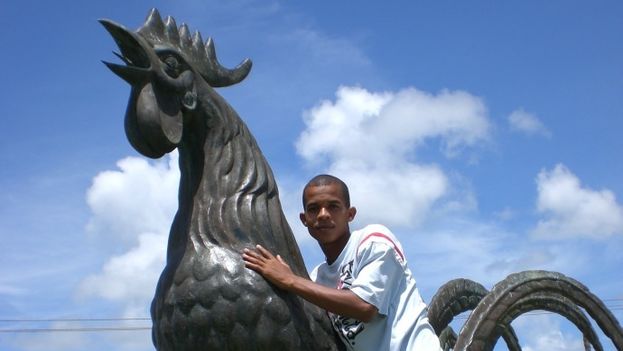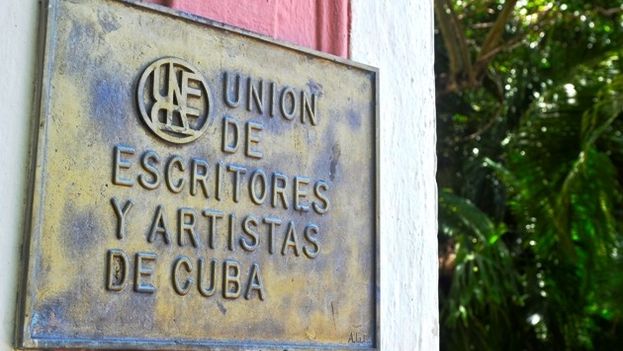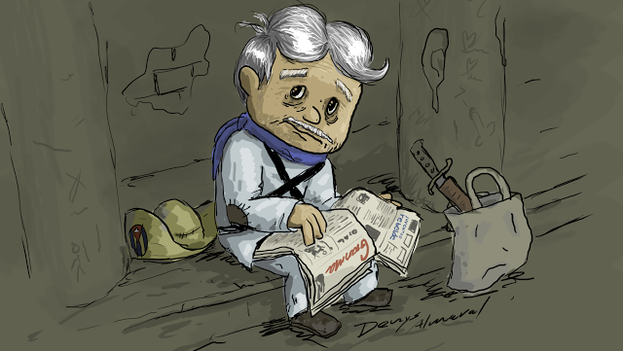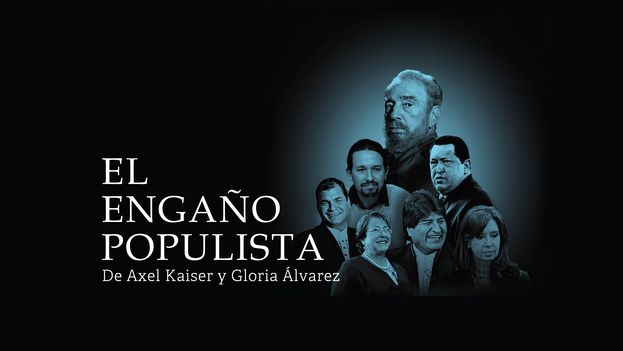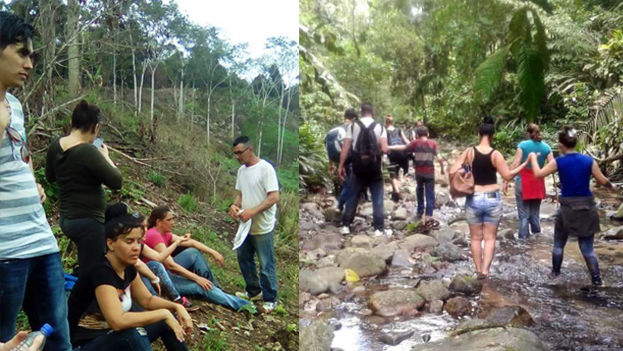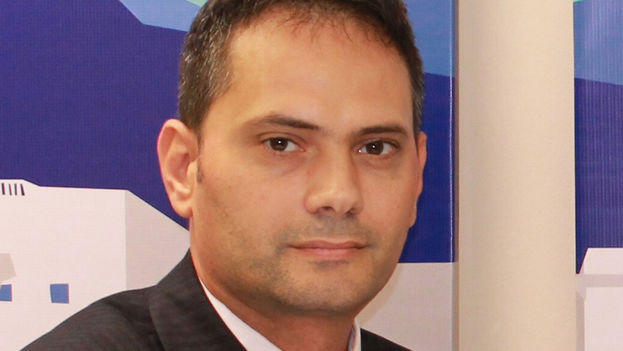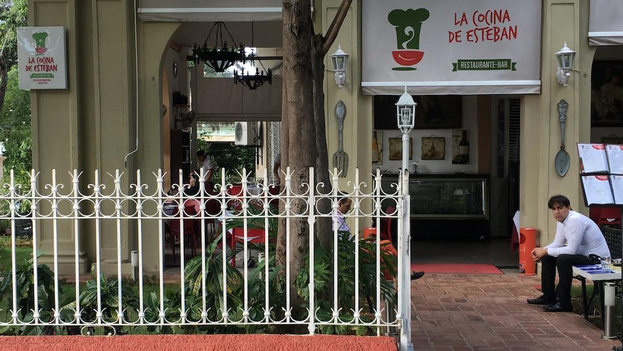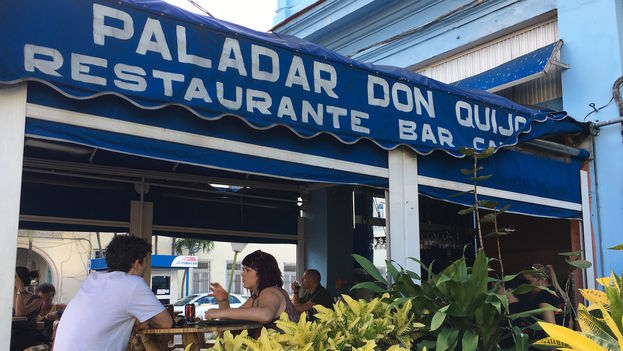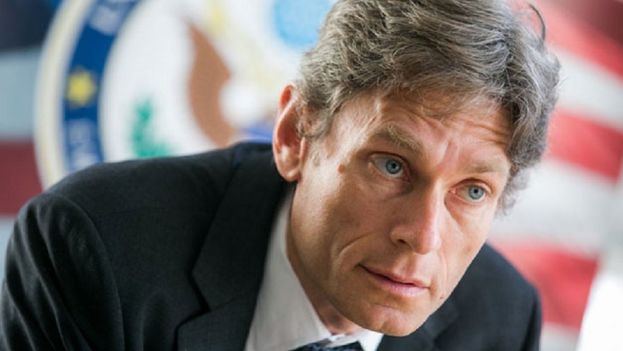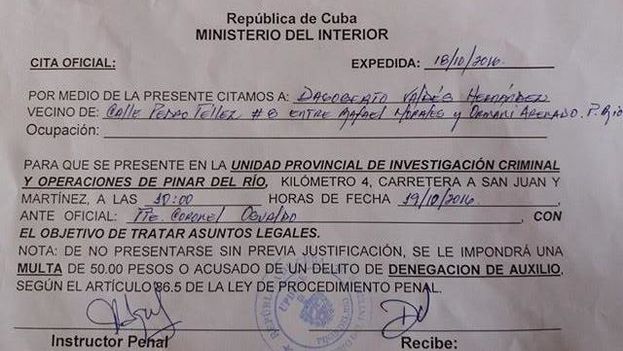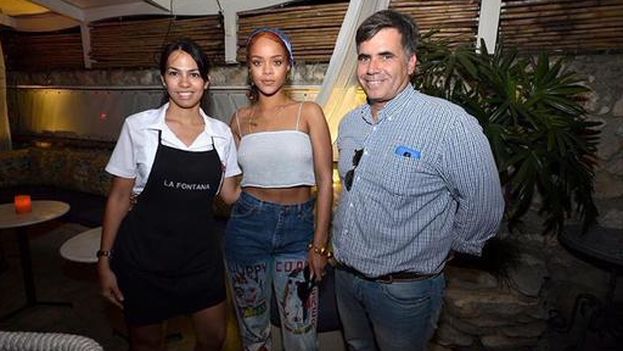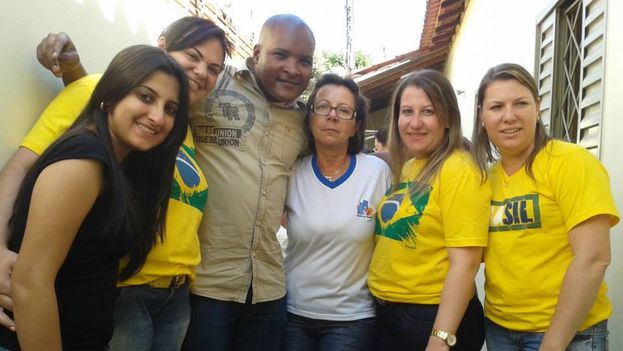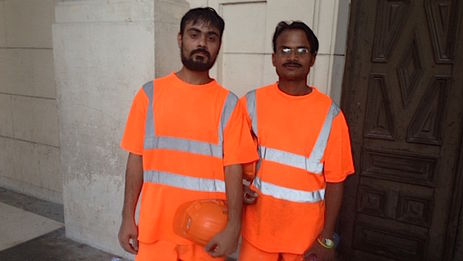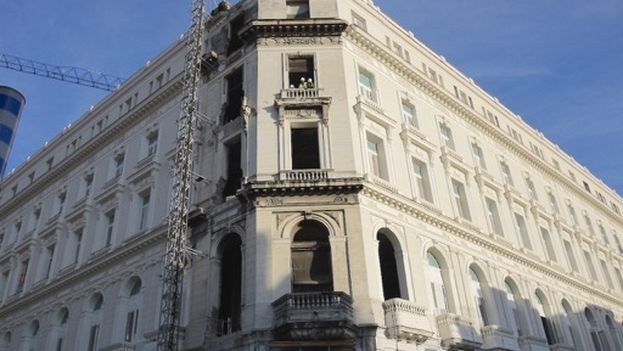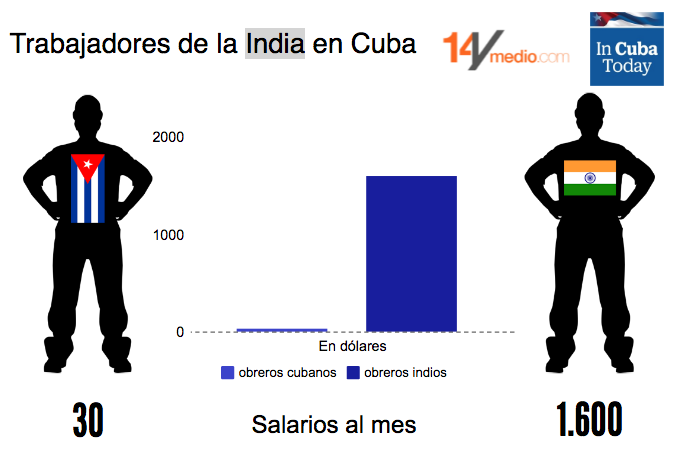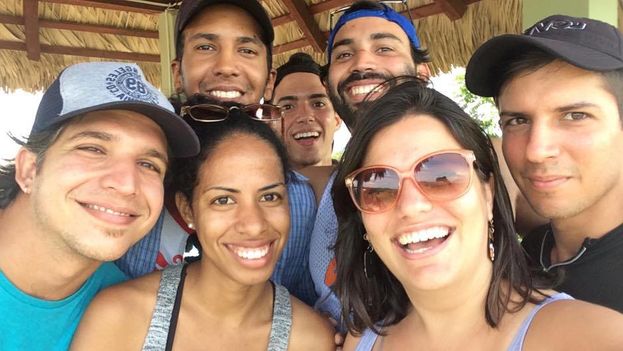This story started last July 23, when my cousin’s wife told me there was a boat leaving to take people to Mexico, some of them from Florida, the name of our town in Camaguey. She said the trip would cost between 2,000 and 3,000 dollars a person, but along the way – when I could no longer turn back – I discovered the real cost was 10,000 dollars.
The journey came like a hope, because everything was going badly for me at that time. I had had problems with the inspectors and the police had taken away my business license. I also had problems in my personal life.
Previously I wanted to leave the country and several of my family members had abandoned the island. Although I’m not in agreement with the system of government, the reasons that led me to leave had nothing to do with my political ideas, but with personal circumstances. I was a way to escape: I was presented with an opportunity and without thinking about it I undertook the journey. continue reading
I left in a rented car from Fontanar headed to the bridge of the PRIMER ANILLO of Havana, where a group of people had already gathered to be picked up. From there we were taken to the city of Pinar del Rio in a private truck being used to transport passengers.
During this leg of the journey I still felt sure about what I was doing. I believed it was the solution. On arriving in Pinar del Rio a gentleman picked us up outside the bus station and took us to his house. Then, in another truck, we took the highway to a town called Las Marinas. They collected us in these carts that they call spiders and took us to a farm.
We were 32 people, 20 from Pinar del Rio, 6 from Santiago de Cuba, and the other 6 from my town of Florida. There were no children, just 29 men and 3 women. Among them were 2 young men who had deserted from the border guards, taking their uniforms, their guns and leaving their jeep abandoned.
Once there, there was already no way to turn back. The only chance to abort the trip was if the border guard troops found out about it and interfered, or if the boat was intercepted at sea. They made it very clear that if we tried to leave or if we didn’t want to go, they would put an end to our lives.
There was no way to communicate with anyone, because we had to give up our cellphones. We could only go with a change of clothes, a package of cookies, a bottle of water and the money we had. We weren’t even allowed matches.
I wanted to call my wife but I knew they wouldn’t forgive me if I did so. However, I consoled myself thinking that I was making the journey for the two of us and if it worked out, I would find a way to get her out, to leave all the problems we were going through and to start again.
At the farm they didn’t give us any food. Many things were going through my head. I felt insecure, but the only thing left to me was to go forward and ask God for things to turn out well. The people got that far, although we didn’t know each other, were pretty communicative. We tried to help each other.
We slept one night at that farm, where there were several animals like cows and horses, but fortunately no mosquitoes, only some MORO crabs who were all around us because we were near the beach. Some farmers watched us at night with their faces covered, so they couldn’t be identified in case the border guards raided the placed.
During the night the time the boat would leave was changed several times, until some demanded to know the truth. After some pressure they told us it would leave at 7:30 in the morning. Then they gave us more warnings and brought us a jug of water
Around seven in the morning the farmers returned to tell us to get ready, the boat was about to some. When we approached the rock along the shore we could see in the distance what looked like a dove in the water. At that point I don’t know what I felt, I just remember telling myself, “Yes, this is what I should do.”
We were content. However, until that moment I also hoped that the boat wouldn’t arrive. I felt a desire not to make that journey, to put it all behind me and to return to the people I loved. At the moment you leave Cuba, that is when you value it.
Around 7:20 in the morning on July 24 the boat arrives. When we were far from shore I put my hands to my head and said, “My God, what have I done?” But I could no longer throw myself in the sea. The boatman pulled out a pistol and let off two shots in to the air to let us know we were under his control.
The crew was made up of two people: a boatman and his helper, both Cubans. The helper was called “El Menor” and was originally from a town in Pinar del Rio called El Cayuco, while the boatman was called “El Yuma” and was from Güines. Both of them live in Mexico and can’t enter Cuba legally, because they are wanted to drug trafficking, human trafficking and murder.
The boatman bragged about having killed his previous helper, a Honduran who was a boat mechanic.
The two men took security measures, like making us throw away our shoes so no one could escape when we landed. One of them told us that from the same place we had left from, they had made more than 30 trips last summer.
They bragged about coming and going from the island as if it was their house. According to them, in Cuba there are no teams to pursue fast boats. They leave Mexico like a fishing charter, and at night stay 60 miles out and advance slowly as if it was a fishing boat. When the sun rises, they rush in at full speed, pick up, and leave in the same way.
At around 30 miles they made a call to Mexico, to the boss of the business, and told him only: “We’re coming.” The boatman boasted that five boats belonging to the same business owner to look for people in Cuba, but only he had been able to pick up.
The trip was long because they were forced to enter Mexico at night. We arrived at Cancun, near the hotel area, after nine at night. We landed on a dock where we had to pay 100 dollars each to enter.
We were waiting for two small buses and boarded them, 16 people each. They took us to an abandoned warehouse, a sort of old rented building with all the security for this type of business. There two groups of us joined up with more than 50 people who had arrived on previous trips.
On arriving in Mexico we had to get the money to pay them. They took care of the paperwork for each migrant to fly north and present themselves at the US border. The entire trip cost 10,000 dollars, but I had no money to pay. At that point I began my odyssey.
The abandoned warehouse had two floors. Upstairs there were four bedrooms and a large living room where the TV was. One of the rooms was for the guides, who are responsible for finding people in Cuba who want to leave the country. The guides are more comfortable, with mattresses and food, and the trip is free. They are also used to control discipline. The other rooms are like cells.
The bosses were Cuban. They call the main one El Millo and he never shows his face in the business. Later it was Julian, El Negro, who is from Matanza and “attends to” the migrants and helps them do things like call their families. He functions as an intermediary. In addition, there are people everywhere who collect money.
A man named Rey, from Vertientes in Camaguey, is known as El Pinto and looks after the house. He is also responsible for the tortures.
They collected all our clothes from us, our identity cards, passports, and money to prevent any change of escape. They left us with shorts and a t-shirt, which is the “uniform” of the people help in that place.
The next day, at seven in the morning, we had a piece of bread and a glass of water for breakfast. Then they started the calls with our families, most of whom were unaware of our exit plans. They only allowed us to speak for a few seconds to they would know it was true that they had us.
If the family said they didn’t have any money, they warned them they would put their relative in a tank of acid and nothing would ever be heard of them or they would put them back in a boat and take them 30 miles out and throw them to the crocodiles.
I wasn’t tortured but others didn’t enjoy the same luck. They just punished me for not having any money and took me to a room where they only took me out for a bath once a week. We couldn’t watch TV or talk to anyone, and we had to be quiet and sleep on the floor.
I saw how they beat up several people, among them a young man that almost killed. Another who didn’t have any money, they broke two of his fingers with an ax.
If someone fell ill and they didn’t see any chance to get any money from them, they’d take them away and they never came back. We didn’t know what happened with them, if they kept them prisoner or killed them. Sometimes they would split someone’s nose and send photos to the family to scare them and threaten them.
Those who didn’t have any money didn’t receive any food. I spent 38 days with just water but no food. Sixty-nine of us lived like this, because in my group there were only 14 with money who were able to go to the United States.
It was better not to be very communicative, because they could think you were up to something, or going to flee or something else. Some, to get in good with the bosses, brought them information, so I preferred not to speak.
I stayed in a corner, quiet, sitting there, and when I was tired I slept to avoid reprisals of they became violent.
I wasn’t afraid but I worried about what my mom was able to do and thought a lot about my grandfather. On the other hand, they were convinced I was going to get out of there but couldn’t imagine how or when.
On the 35th and 36th day they started saying they were going to toss people 30 miles out or take us to the migrant centers of Chetunal and Tabasco. They took a photo of me and said to be ready at seven at night.
They put me in the taxi and called the federal police, with whom they do business. They sent the photo and the taxi information and later I just had to get in the police car. I was with the federal police for 48 hours, with the right to an attorney and they gave me a book that explained my rights and duties.
They gave us food and treated us well. The police were corrupt and also offered us the chance to continue the journey in exchange for money.
From there, they took us to the migrant center in Chetumal, where I was for 17 days, waiting for everyone. When I got there, there were 29 Cubans and on the day I left 17 more came. It was amazing to see how Cubans who don’t demand their rights on the island, do so there. They were protests about the cleanliness, water, food.
I knew they were going to deport me, but I still had the chance of refuge or political asylum. I thought about this last option, but gave up because I missed everything in Cuba. Despite all the problems I’d left behind, my country was better.
On 22 September they took me in a can to the Cancun airport and the next day, around seven in the morning, I left to fly to Havana.
They took all of us to the migrant center at Valle Grande prison, where they analyzed us, took statements and checked for criminal histories. The treatment was good, respectful and they didn’t ask us about anything. After a period of quarantine they sent me to the police station in my town and from there, home.
I’m happy to be in Cuba, with my family, my friends, and to have the chance to continue my political activism. Although sometimes I thought the solution was to emigrate to the United States, I don’t think I will try to leave again. I just want to establish myself here and have a family.
Although it’s hard to live with the problems we have in Cuba, the situations that face us when we try to exit illegally are harder. I urge everyone to fight for change in Cuba, since leaving the country is also leaving everything you love.
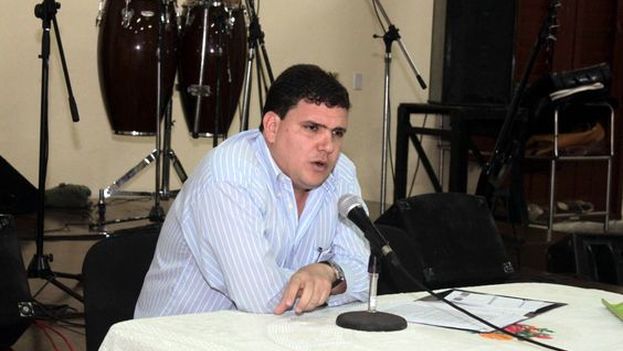
![]() 14ymedio, Mario Penton, Miami, 26 October 2016 — “It’s not because you write in OnCuba, it is what you write,” were the words used by the authorities of the Faculty of Law of the University of Havana to tell Juan Antonio Fernández Estrada that he could not continue to be a university professor. This measure “put the lid on the jar” and provoked a reaction from the teacher, who says he will not stay silent about this new outrage.
14ymedio, Mario Penton, Miami, 26 October 2016 — “It’s not because you write in OnCuba, it is what you write,” were the words used by the authorities of the Faculty of Law of the University of Havana to tell Juan Antonio Fernández Estrada that he could not continue to be a university professor. This measure “put the lid on the jar” and provoked a reaction from the teacher, who says he will not stay silent about this new outrage.
